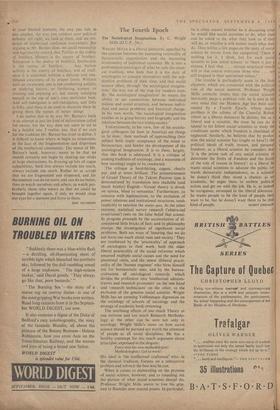The Fourth Epoch
The Sociological Imagination. By C. Wright M ills. (0.0 .P., 36s.)
Witicaur Mit.Ls is a liberal democrat, appalled by the contrast between the increasing rationality of bureaucratic organisation and the increasing irrationality of individual existence. He is also a professional sociologist of what he calls the classi- cal tradition, who feels that it is the duty of sociologists to concern themselves with the sub- stantive problems of their time, and that social science offers, through 'the sociological imagina- tion,' the way out of the trap for modern man.
By 'the sociological imagination' he means the ability. to see connections between individual milieus and social structure, and between indivi- dual and social problems and historical change. In his own words, 'the sociological imagination enables us to grasp history and biography and the relations between the two within society.'
Unfortunately, in his view, few of his sociolo- gical colleagues (at least in America) see things as he does: their methods of approaching their subject both imply acceptance of the trend to bureaucracy, and hinder the development of the sociological imagination. It is to them, largely, that this book is addressed. It is a critique of existing traditions of sociology, and a statement of how sociology ought to be conducted.
The critique is hard-hitting, cogent, clearly
put, and at times brilliant. The pretentiousness of Grand Theory of the Talcott Parsons type is demonstrated by translation into readable (and much briefer) English—'Grand theory is drunk on syntax, blind to semantics.' Furthermore, its concern with legitimations, to the exclusion of power relations and institutional structures, tends implicitly to sanction the status quo. At the other extreme, statistical survey research ('abstracted empiricism') rests on the false belief that scienti- fic progress proceeds by the accumulation of ill- considered little bricks of fact; and its philosophy cramps the investigation of significant social problems. Both are ways of 'insuring that we do not learn too much about man and society.' They are reinforced by the 'practicality' of approach of sociologists to their work, both the older liberal practicality of the social reformer which assumed multiple social causes and the need for piecemeal cures, and the newer illiberal practi- cality of the 'human engineer' who hires himself out for bureaucratic uses; and by the bureau- cratisation of sociological research, which divides the profession into 'intellectual adminis- trators and research promoters' on the one hand and 'research technicians' on the other, to the exclusion of the genuine social scientist. Wright Mills has an amusing Veblenesque digression on the sociology of schools of sociology and the strategy of academic book reviewing.
The sterilising effects of too much Theory at one extreme and too much Research Methodo- logy at the other can be seen not only in sociology. Wright Mills's views on how social science should be pursued are worth the attention of people in all social disciplines. He has a healthy contempt for too much argument about principles, expressed in the slogans: Every man his own methodologist! Methodologists! Get to work!
His ideal is 'the intellectual craftsman' who, in the classical tradition, focuses on a substantive problem and solves it the best way he can.
When it conies to elaborating on the promise
of social science, however, and to rounding out the picture of what social scientists should do, Professor Wright Mills seems to lose his grip, and to flounder over crucial points. In particular, he is often unsure whether he is discussing what he would like social scientists to do, what they can be asked to do, what they look as if they will do, or whether it will matter much what chi.), do. Thus within a few pages on the unity of social science he moves from the categorical 'There is nothing for it, I think, but for each social scientist to join social science' to 'there is just a chance, I feel, that . . . certain structural trends will in due course overcome those who . . . are still trapped in their specialised milieu.'
The trouble is particularly acute in the final chapters, which arc concerned with the political role of the social scientist. Professor Wright Mills correctly insists that the social scientist inevitably plays a political role: he is sure in his own mind that the Modern Age has been suc- ceeded by a Fourth Epoch, whose major problem is the advent of the Cheerful Robot, whom as a liberal democrat he detests; but as a liberal and a scientist, the most he can do is appeal to his fellow social scientists to study the conditions under which freedom is cherished or neglected. Similarly, he believes that by profes- sion the social scientist has (ought to have?) the political ideals of. truth, reason, and personal freedom; as a liberal scientist he considers that 'it is the prime task of any social scientist to determine the limits of freedom and the limits of the role of reason in history'; as a liberal he wants social scientists to educate the public to- wards democratic independence; as a scientist he doesn't think they stand a chance: as an academic, he urges them to eschew political action and get on with the job. He is, as indeed he recognises, swamped in the liberal dilemma: he wants people to be the kind of people they want to be, but he doesn't want them to be that


































 Previous page
Previous page